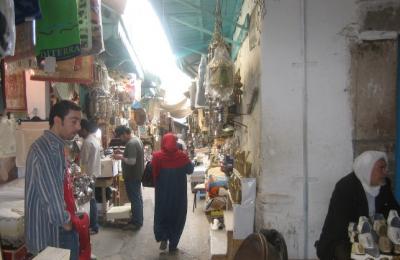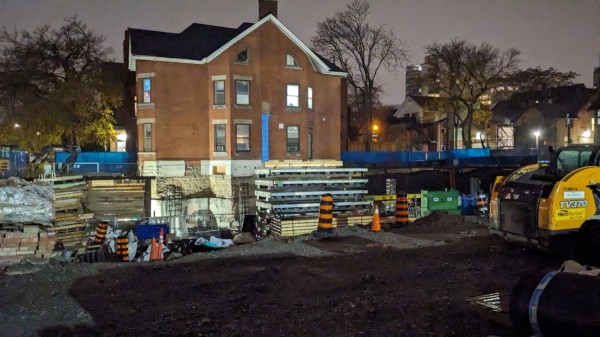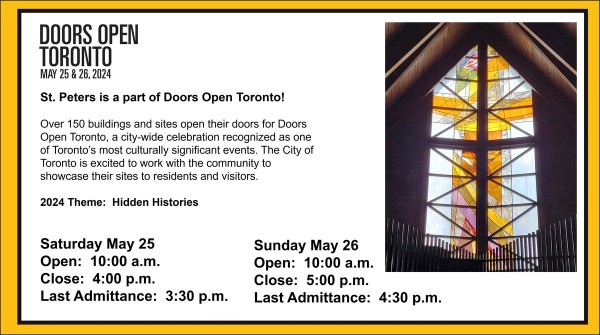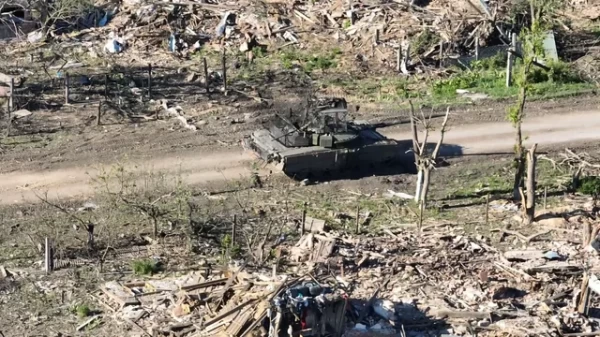We were all taken on a tour of the castle, especially its cellars — arched and groined and spacious. One cellar included a regular American beer bar! At little round tables in one of the rooms we sat down and partook of ice-cream so rich it was almost iced butter; and large glasses of champagne. At other tables, some people played bridge. And presently I was told that the President wanted to see me.
Mr. Leonard and Mr. Rei accompanied me and we found him seated alone in a smaller room off the main salon, at a table. We sat down with him there in the most informal way. “So you think Estonia is the happiest country in the world?” he said to me, smiling. Throughout the interview he spoke in German, translated by Mr. Leonard, or sometimes by Mr. Rei; but he looked right at me when he spoke and I generally got pretty near his meaning; and I rather think that he got mine. “I didn’t quite say that,” I replied. “I said it was the happiest country I had yet found. And so it is. You know what I mean by a happy country?”
“Yes. And I think you have a very good way of judging a country,” he said. “You are going home soon? I wish you could stay longer and see more. I am sorry I could not meet you before.”
“I am sorry, too, for I wanted very much to see you. My visit here would not otherwise have been complete. I thank you for this opportunity, and I have some questions I have been saving up to ask you.”
In the conversation that followed I quite forgot that he was a dictator having, for the time being, supreme power over a million and a quarter people; and I have a strong feeling that he, also, forgot it. His whole aspect was serious, sincere, and self-forgetful. I thought him a practical, kindly man, with a daylight mind.
“Now that the new constitution is completed,” I asked, “will new elections be held through the country for all offices?” Meaning, of course, including the office of President. His smile showed that he understood, and he answered firmly:
“Yes. But first the people must have time to study the new constitution until they thoroughly understand it and know what they are doing. We will declare elections on our next Independence Day — that is February 24, 1938 — and will proceed to elect a completely new Parliament and a new set of government officials.”
“What becomes of the present Parliament which, I understand, was suspended, but not dissolved?”
“It will be automatically dissolved when the new Parliament is elected. Meanwhile, there is nothing for it to do. It will never be reconvened.”
I told him I had heard the Estonian banking system highly praised. He misundertood me and thought that I was referring only to the co-operative banks. He said that these institutions were indeed very close to the people and helped them in every way.
I said I admired the co-operative banks, but I also admired the government-controlled Eestipank, spreading through the whole country, with its many branches, and especially its two departments, the Land Bank for the benefit of farmers and the Mortgage Bank for the benefit of manufacturers and businessmen, adding that I knew our government had been studying the Estonian banking system.
He said: “It is, of course, much easier to organize and operate a sound banking system for the benefit of all the people in a small country like Estonia than in a huge country like the United States. We can operate banks at so low a cost, and make long-term loans at such low interest, and keep our assets so liquid, because, first, the government owns two-thirds of the stock of our chief bank and its branches, and secondly we do not permit our banks to be tangled up in any way with Stock Exchange speculation. I used myself to be Chairman of the Board of the Stock Exchange here and so I have first-hand knowledge of the difficulties such speculation puts in the way of good banking.”
I next asked why the government, which owned the oil-shale deposits, and in at least one instance was operating them, had rented out three of them to private capitalist corporations.
“We never wanted to operate the oil shale works,” he replied, “but in the beginning it was necessary. No one really knew the value of the deposits. The problem of working them and refining the product was a new one, and private capital was unwilling to take the risk. But the government saw that in these deposits we might possibly have what otherwise we lack — a raw material peculiar to ourselves and valuable for the industry — so it was worth our while to take the initiative. properly developed and exploited, the mines might prove of great value to the state. Therefore it was reasonable for the state to do the experimenting. But when we had proved the value of the deposits and established the best method of treating them, then private capital was willing to come in and carry on the business.”
“Yes; but I don’t see why you were willing to let it,” I persisted. “Why do you prefer private exploitation for private profit to government management for the good of all?” His eyes twinkled. Evidently, he is no theorist, but looks straight to the practical advantage to be derived from a given move.” “Because it is not only necessary to produce,” he explained. “It is also necssary to sell. And private corporations have developed the arts of selling and advertising to a very high degree. they have, in this respect, much mor skill than our government has. So we let them use that skill to find markets for our shale, meanwhile paying us rent for the privilege of digging it out and refining it.” We both laughed at this shrewd reply.
(To be continued)
A Search For a Happy Country (41)
Järjejutt
TRENDING






















